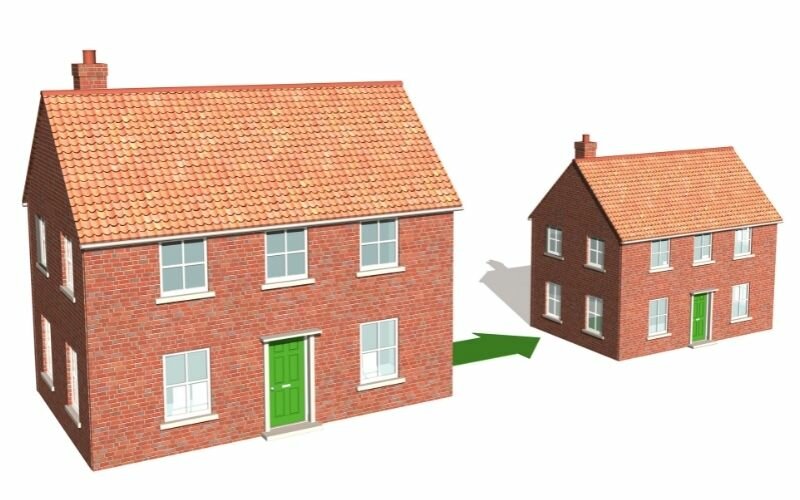
The real estate market will tell you different things when you’re someone interested in buying or selling a house. But one common thing they say is that the transition that comes with selling a home or moving to a smaller one can be emotionally and mentally taxing.
This begs the question, “when is it the right time to sell your home and downsize?” Let us help you pinpoint when, why, and how to do it. This kind of transition doesn’t always have to be like pulling teeth, right?
1. Your Monthly Housing Expenses Keep Going Up
Finances are usually the most common reason people downsize or sell their large houses. As it is as clear as day now, a home is one of the most important investments a person will make in their adult life. The money you put in to buy the house is one thing, but how much you spend to keep it intact is another story.
The rule of thumb is to spend around 30% of monthly income on housing expenses which typically includes mortgage payments, utilities, taxes, and other maintenance costs. However, if you start spending more than 30% of your budget, then it’ll ultimately become a financial burden in the long run.
Thus, it would be ideal to start looking for something more equitable but still meets most of your demands regarding having a perfect home.
2. Your Schedule Doesn’t Permit Maintaining Your Home Efficiently Anymore
Those with busy work and family lives are often the culprits of some poorly maintained houses. With many people shifting to work-from-home set-up full-time or on a hybrid schedule, the demands of maintaining a place filled with people 24/7 can be a struggle.
Vacuuming a two-story home, mowing the lawn, and even cleaning the gutters are usually hard to ignore for a long time if you want to be consistent with the upkeep of your property.
This is one of the many reasons people with small families or couples with duplex houses with busy schedules often lean on downsizing in the long run.
3. The Outside No Longer Matches The Inside

There’s an absolute truth when they say your environment often plays a significant role in how you feel and plan around your life. If you’re living in the big metropolitan cities like New York City or Chicago while nursing a newborn, the chances of all the bustling noises at night could have strengthened the urge to move to the suburbs.
Sometimes, many people downsize or sell their homes because the environment they live in no longer fits the lifestyle they are living or want to live. It can also go in reverse; some people who live in the suburbs with full houses and backyards often downsize when moving to the city for a new job.
It’s common for young people in their twenties and thirties to move around a lot and deal with the transition of selling and renting rather than buying again, which is expected despite the dwindling real estate market.
Best to always consider where you are in life before you purchase or sell a home to ensure you’re not jumping the gun or drastically making a big life decision.
4. Many Rooms in the House are Empty and Unused
Having a large house or a mansion filled with people is always nice when you’re a family guy or gal. The only downside is, not everyone in your home wants to stay put for a long while. Kids grow up, some couples get divorced, and other family members move away.
That’s completely fine unless you’re putting too much maintenance and spending on property taxes, only to find out that three of the five bedrooms in your house haven’t been lived in for a long while.
Yes, you can probably list them on Airbnb for a couple of backpackers and travelers to occupy for the time being, but it’s not ideal for older folks who prefer to have their peace.
Thus, an excellent opportunity to sell large houses above market value or move into a smaller property, preferably one where you don’t have to do a lap around the house to get to the kitchen?
5. Turning Home Equity to Retirement Income is a New Priority
Other homeowners may want to pass down their property to the next generation and have it around as family homes. This is common for mansions and larger estates, but for those who live in penthouses and duplex homes, it’s wiser to turn the house into a valuable asset by taking advantage of its equity. It is an excellent reason to downsize and get income for your retirement using a reverse mortgage, for example.
Turning home equity into retirement income is an innovative and savvy way to secure your future. Not to mention, it can save you thousands of dollars on property taxes and maintenance costs since it usually has a high chance of being lowered.
Best to find the right real estate agent who can help you sell your family home and maximize its value for some security in your elder years. Nothing wrong with planning by getting ahead of it!
Lean on the Transitions

A large part of smart real estate and home selling is about valuing transitions that people make when buying or selling a house. Downsizing or upsizing property preferences can be intimidating at first, but when you realize that there’s a more thoughtful way to live while outsmarting real estate, the possibilities are endless.
More often than not, embracing the opportunity to move into a new place, smaller or farther away, might make sense for those embarking on new journeys. So, when is the best time to sell your house or downsize? Simply when you need to transition in life, maybe?
Learn more about how to sell your house for cash and with the right people at SEEB Homes.
